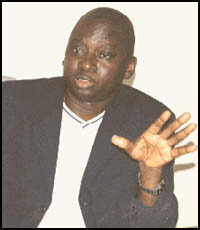 ENERGY, A POWERFUL NEED ENERGY, A POWERFUL NEED |

An indication of increasing industrial activity is the exponential growth in the energy demands of The Gambia. Available and affordable energy is central to sustaining this growth and very crucial to the feasibility of the country's envisioned year 2020. Yet, there is a painful deficiency in The Gambia's energy sector. The ratio of power generation to its need is crippling, "Our coverage level is very low", admits Serign Conteh, Managing Director of the state owned National Water and Electricity Company (NAWEC), a limited liability company formed in 1996 to ensure efficient and adequate provision of energy. "We need about 80 MW to satisfy the existing demand for this year and the next," added to which is an envisaged demand of 30MW from foreseen developments in the tourism industry. But NAWEC can only generate 28MW and hope that the remaining comes from somewhere else. Transmission and distribution technicalities are other areas where attention must be paid because about 40% of total energy generated is presently wasted, making the shortage more acute. Besides these scars, the price of electricity is high and uncompetitive.
This puts the government of President Yahya Jammeh in a very awkward position. "So far, I admit that I have succeeded in all other areas except in the provision of energy for The Gambia," the President sadly admits. But Jammeh is too fiercely determined than be bugged for too long by a problem; he took over the energy portfolio and attached it to the long list of his own duties. "I cannot see anything preventing me from succeeding (in this sector)," he remarked. That may be true, especially as the doors to private sector participation are all flung wide open. As NAWEC'S Conteh notes, "we have realised that our efforts alone cannot solve the energy problems of this country, we must welcome private players".

Energy is on the list of priority investments eligible for special incentives, which means that investors in the field needn't bother about customs duties on their capital equipment, machinery and other materials for the industry. Spare parts, raw materials; semi-finished items and all other supplies to be used in the production process are also part of the exemption. As if these were not enough, sales tax on production equipment and turnover tax will be on holiday for interested investors.
| Foreign investors had better seen the deficiency in the sector as a honey of opportunity especially as the market for energy extends beyond the Gambian borders. "This is a unique opportunity", declares Conteh, "we are more or less in the middle of Senegal and Guinea, so we can easier supply energy to both countries than they can". Underscoring the potential of private participation in the sector is the partnership between NAWEC and GAMPOWER, an independent power provider (IPP).
GAMPOWER provides 30% of available power with its 11MW generator. And according to Conteh, the relationship is sound and excellent.

Regulations for full privatisation of the sector are still in the preparatory stage. Funded by the World Bank, studies in the institutional arrangements are fast apace and the resulting modalities are expected soon. Investors needn't wait till then though, there is a clearly defined role already in place for the private sector in partnership with NAWEC. The Gambia River also has an untapped hydroelectric potential of 88MW, which as Conteh notes, is the country's hope to contribute to the African Powerful Project (APP) initiative. A project designed to connect a number of West African countries on the same power grid.
However, the government is not merely waiting for the private sector to turn around the fortunes of the industry. The relevance of adequate energy availability to The Gambia's industrial experiment and its position as an inevitable infrastructure has spurred a number of projects and bilateral agreements to ensure significant improvements in the sector. A bilateral understanding between The Gambia and The Republic of China on Taiwan is expect to materialise, especially as President Chen Shui-bian promised to do everything possible to assist the ailing sector. The bilateral collaboration has not stopped Taiwanese investors form showing interest, and it shouldn't deter any other investor.
A new 6MW generator has been purchased to complement the available capacity and reduce the cost by at least 10%. Two other 14KW engines recently bought from the UK would power the Brusubi Estate, a newly completed housing project. There is also the promise of an additional 12MW generator from a French investor. And for the provincial zones, a rural electrification project under the National Electrification master plan is also billed for implementation by March 2001. Supported and funded by the African Development Bank (ADB), the Islamic Development Bank (IDB) and BADIA, the US $16 million project will electrify 26,000 rural and sub-urban settlements around the country. The aim is to encourage the establishment of relevant industrial activities in those zones and enhance the creation of rural jobs, which will ease unemployment and minimize the population drift from rural areas to Banjul. |

